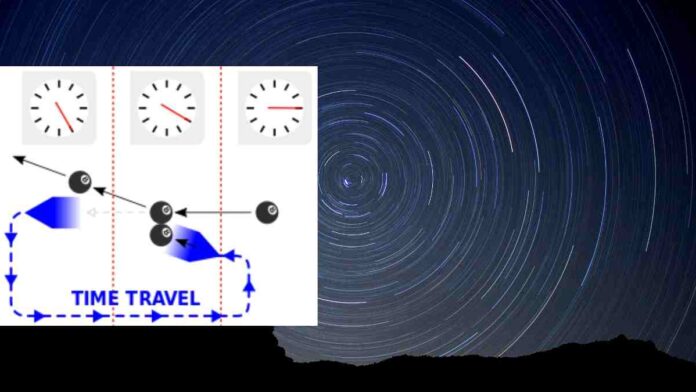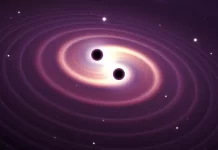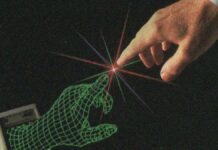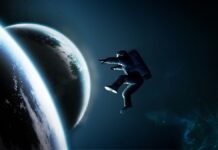The grandfather paradox is the so-called most crucial objection to the logical possibility of traveling back in time. This paradox has convinced many people that traveling back in time or backward time travel is almost impossible; how? Know more in this article…
Contents
What is the Grandfather Paradox?
The grandfather paradox is a time travel paradox in which discrepancies emerge through changing the past. The name comes from the general description of the paradox: a person travels to the past in time and dies his Grandfather before his father or mother is born, preventing the time traveler’s existence.
The grandfather paradox is not particularly concerned with the paradox of simply killing one’s Grandfather to prevent someone’s birth. Instead, this contradiction is the relation of any action that changes the past, in which the past will be different from the way it was before, which is a contradiction.
History of Grandfather Paradox
A description of the Grandfather paradox can be seen in books written in early 1929. In 1931 it was told in a letter to the American science fiction magazine Amazing Stories. Early science stories dealing with this paradox are the short story Ancestral Voices, written by Nathaniel Schachner and published in 1933, and the 1944 book Future Times Three. Many other compositions of the 1930s and 1940s appeared on various themes of this subject.
Types of the grandfather paradox
The Grandfather paradox describes any past change and can be presented in many forms. For example, physicist John Garrison has shown a variation of the paradox of an electronic circuit, which involves sending a signal through a time machine to shut itself down and receiving the signal before sending it. The equivalent paradox is known in philosophy as the “retro-suicide paradox” or “autoinfanticide,” going back in time and killing a younger version of itself (such as a child).
Hitler Paradox
Another form of the Grandfather’s paradox is the “Hitler Paradox” or “Hitler’s Assassination Paradox.” Its description can be seen in many science fictions, in which the hero goes back in time to die, Adolf Hitler, before he can provoke World War II and the Holocaust. However, instead of physically stopping time travel as necessary, the action removes any reason for the journey and any knowledge that ever existed, thus removing any point of the trip in the first place. Additionally, the consequences of Hitler’s existence are so memorable and ubiquitous that for anyone born after the war, it is possible his influence influenced his birth. Thus the lineage aspect of the paradox will directly apply in some way.
Parallel universe
Some scientists say that if the Grandfather paradox were possible, it would create a parallel universe. This means that when the time traveler goes back in time and kills his Grandfather, he is killing a similar universe version of his Grandfather, and the time traveler’s original universe is untouched; that is, the time traveler’s present time is the same. Therefore, it will remain the same. It has been argued that since the traveler delves into the history of a different universe and does not have its account, it is not “real” time travel. In other types, the traveler’s actions of that time do not influence outside his own experience, as depicted in Alfred Bester’s short story The Men Who Murdered Mohammed.
Philosophical analysis of the grandfather paradox
Without knowing whether it is physically possible to travel in the past, it is possible to show by using modern modal logic that past results are transformed into logical contradictions. If it is true that the past happened in a certain way, then it is wrong and impossible for the past to occur in any other way. A time traveler will not change the past as he is. History will only act in a manner that is already consistent with what was necessary.
The idea of the grandfather paradox has led some to the notion that time travel is, by nature, a paradox and, therefore, logically impossible.
General relativity
Considering the possibility of past travel in the fictional universe described by the famous fictional Kurt Godel, there may be a sort of confusion of that time. So he suggests something along the lines of a block time view with just one more dimension, like time-space, in which all events are fixed within this 4-dimensional “block.”
Causal loop
If a grandfather paradox does not produce a time journey of yesterday, it creates a causal loop. Novikov’s self-consistency theory expresses an approach to how time travel would be possible without the generation of contradictions. According to this hypothesis, timed curves (time machines) in or near physics can only conform to the universal laws of physics and thus only self-consistent phenomena. Therefore, whatever a time traveler does in the past must be a part of history all along, and time travel can never do anything to stop the journey, as it would represent dissonance.
Novikov et al. used the example given by physicist Joseph Polchinski for the grandfather paradox of a billiard ball going toward a time machine. He showed that the ball originates from the old self-time device and collides with itself, so its short self never enters the time machine.
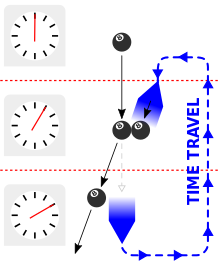
Novikov et al. showed how this system could be resolved in a self-consistent way that can avoid the grandfather paradox, although this creates a causal loop.
Some physicists suggest that, similarly to the chronology protection conjecture approximation proposed by Stephen Hawking, causal loops exist only on the quantum scale, so history loops do not occur on larger scales. Another hypothesis, the cosmic censorship hypothesis, suggests that every closed timelike curve passes through an event horizon, which prevents such causal loops from being observed.
Lloyd and other researchers at MIT have proposed an extended version of the Novikov theory, according to which probability bends to prevent contradictions from occurring. As the universe favors impossible events to prevent impossible actions, the results will turn out to be strangers.
According to Quantum physics
Some physicists have proposed that quantum theory allows time travel where the past must be self-sufficient. However, Deutsch argues that quantum computation occurs with a negative delay — traveling backward — producing only self-consistent solutions. The chronological-violation field imposes constraints that are not apparent through classical logic.
In 2014, researchers published a simulation that validated Deutsch’s model with photons. Deutsch uses the terminology of “many universes” in his paper to express quantum phenomena but notes that this terminology is unsatisfactory. For example, others have interpreted it to mean that “Deutsch” time travel involves a time traveler emerging into a different universe, escaping the grandfather paradox.
The interaction of multiple universes approaches is a variation of the quantum mechanics of Everett’s multiple-world interpretation. This includes the time of arrival in a different universe from where they came from; It has been argued that since the traveler comes from the history of a different universe and not from its history, it is not “real” time travel. Stephen Hawking has argued that even if the MWI is correct, we should expect the traveler to experience a single self-contained history each time so that the traveler lives within their world rather than taking a different journey. Ellen Everett argued that the dictionary’s approach involves “modifying the fundamentals of quantum mechanics; it certainly goes beyond simply adopting MWI,” and even if Deutsch’s approach is correct, This would mean that any macroscopic object composed of many particles would break apart when traveling back in time with different particles emerging in other worlds.
The conclusion
The grandfather paradox is still considered a theory in modern science because, in practice, it has not been possible. However, we hope that on the day when we can travel in time, we will also understand the Grandfather paradox better.
Sources
- Nicholas J.J. Smith (2013). “Time Travel.” Stanford Encyclopedia of Philosophy. Retrieved November 2, 2015.
- Frank Arntzenius; Tim Maudlin (December 23, 2009), “Time Travel and Modern Physics,” Stanford Encyclopedia of Philosophy, retrieved May 25, 2019
